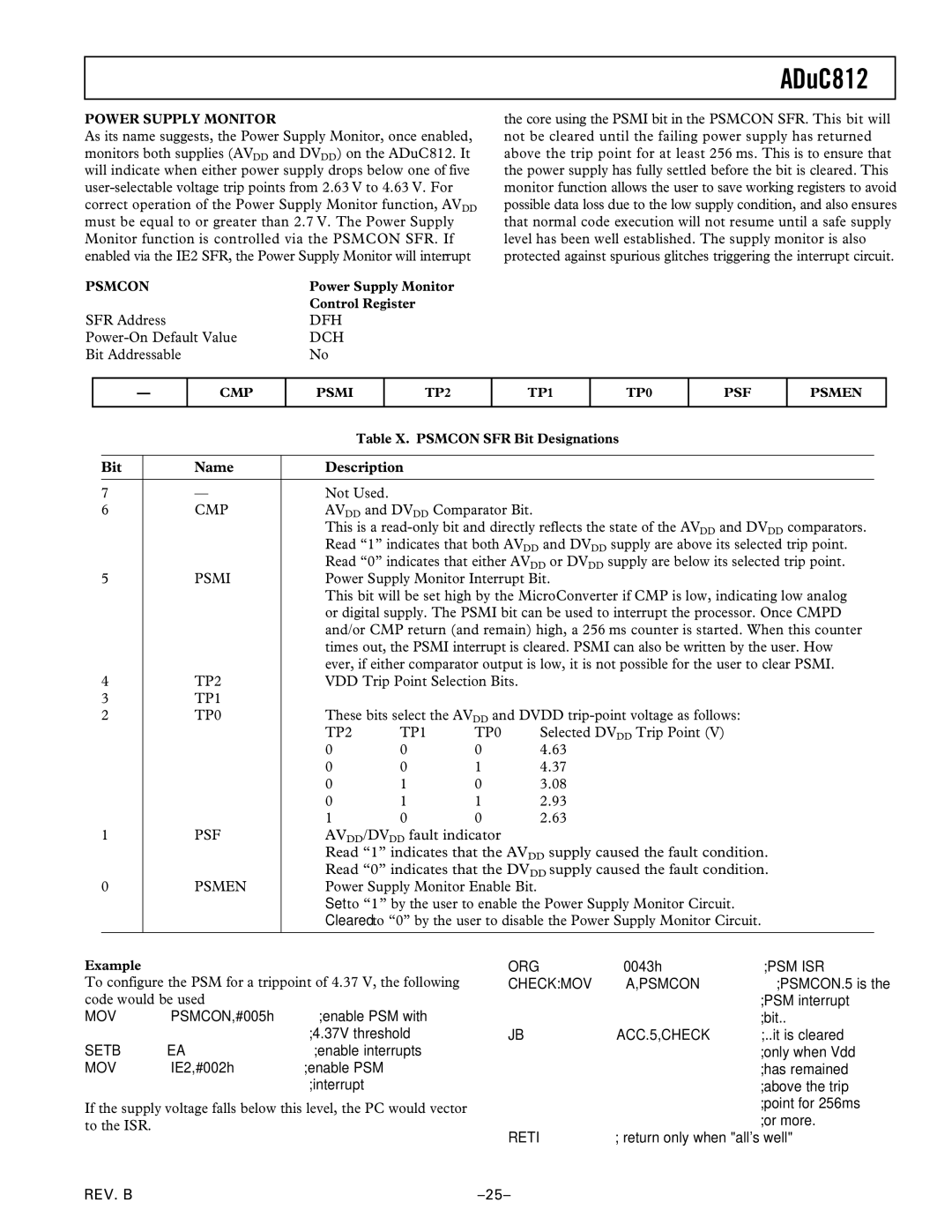
ADuC812
POWER SUPPLY MONITOR
As its name suggests, the Power Supply Monitor, once enabled, monitors both supplies (AVDD and DVDD) on the ADuC812. It will indicate when either power supply drops below one of five
PSMCON | Power Supply Monitor |
| Control Register |
SFR Address | DFH |
DCH | |
Bit Addressable | No |
the core using the PSMI bit in the PSMCON SFR. This bit will not be cleared until the failing power supply has returned above the trip point for at least 256 ms. This is to ensure that the power supply has fully settled before the bit is cleared. This monitor function allows the user to save working registers to avoid possible data loss due to the low supply condition, and also ensures that normal code execution will not resume until a safe supply level has been well established. The supply monitor is also protected against spurious glitches triggering the interrupt circuit.
—
CMP
PSMI
TP2
TP1
TP0
PSF
PSMEN
|
|
| Table X. PSMCON SFR Bit Designations | ||
|
|
|
|
| |
Bit | Name | Description |
|
| |
|
|
|
|
| |
7 | — | Not Used. |
|
| |
6 | CMP | AVDD and DVDD Comparator Bit. |
| ||
|
| This is a | |||
|
| Read “1” indicates that both AVDD and DVDD supply are above its selected trip point. | |||
|
| Read “0” indicates that either AVDD or DVDD supply are below its selected trip point. | |||
5 | PSMI | Power Supply Monitor Interrupt Bit. | |||
|
| This bit will be set high by the MicroConverter if CMP is low, indicating low analog | |||
|
| or digital supply. The PSMI bit can be used to interrupt the processor. Once CMPD | |||
|
| and/or CMP return (and remain) high, a 256 ms counter is started. When this counter | |||
|
| times out, the PSMI interrupt is cleared. PSMI can also be written by the user. How | |||
|
| ever, if either comparator output is low, it is not possible for the user to clear PSMI. | |||
4 | TP2 | VDD Trip Point Selection Bits. |
| ||
3 | TP1 |
|
|
|
|
2 | TP0 | These bits select the AVDD and DVDD | |||
|
| TP2 | TP1 | TP0 | Selected DVDD Trip Point (V) |
|
| 0 | 0 | 0 | 4.63 |
|
| 0 | 0 | 1 | 4.37 |
|
| 0 | 1 | 0 | 3.08 |
|
| 0 | 1 | 1 | 2.93 |
|
| 1 | 0 | 0 | 2.63 |
1 | PSF | AVDD/DVDD fault indicator |
| ||
|
| Read “1” indicates that the AVDD supply caused the fault condition. | |||
|
| Read “0” indicates that the DVDD supply caused the fault condition. | |||
0 | PSMEN | Power Supply Monitor Enable Bit. |
| ||
|
| Set to “1” by the user to enable the Power Supply Monitor Circuit. | |||
|
| Cleared to “0” by the user to disable the Power Supply Monitor Circuit. | |||
|
|
|
|
|
|
Example
To configure the PSM for a trippoint of 4.37 V, the following code would be used
MOV | PSMCON,#005h | ;enable PSM with | |
|
| ;4.37V threshold | |
SETB | EA | ;enable | interrupts |
MOV | IE2,#002h | ;enable | PSM |
|
| ;interrupt | |
If the supply voltage falls below this level, the PC would vector to the ISR.
ORG | 0043h | ;PSM ISR |
CHECK:MOV | A,PSMCON | ;PSMCON.5 is the |
|
| ;PSM interrupt |
|
| ;bit.. |
JB | ACC.5,CHECK | ;..it is cleared |
|
| ;only when Vdd |
|
| ;has remained |
|
| ;above the trip |
|
| ;point for 256ms |
|
| ;or more. |
RETI | ; return only when "all's well" | |
REV. B |
